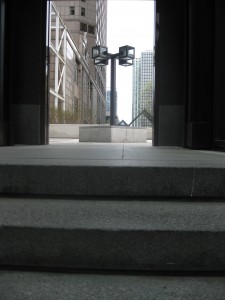At the beginning of my sophomore year in college I was delivering some papers to the counseling center at my university. One of the counselors met me in the waiting room and asked how things were going during those first few weeks of classes and settling back into the routine of college life. I don’t recall what I said to her, but I do remember very clearly what she said to me, “Do you know how many times you just said, ‘should’?” I was startled by her question, but startled in a good way. I left the counseling center a lot calmer, quieter and reflecting on how many times I say, “should.”
met me in the waiting room and asked how things were going during those first few weeks of classes and settling back into the routine of college life. I don’t recall what I said to her, but I do remember very clearly what she said to me, “Do you know how many times you just said, ‘should’?” I was startled by her question, but startled in a good way. I left the counseling center a lot calmer, quieter and reflecting on how many times I say, “should.”
That was many years ago, but it is still a question and a practice that I use today to hone in on how I’m treating myself. It brings awareness to my self-talk and helps me to know if the judgmental voice in my head has taken over.
This month, I’ve been challenging myself, with a practice I call “Should . . . Shoumd.” Yes, I know, “shoumd” is not a word. For me it’s just a sound that reminds me to say to myself, “Does that really matter? What underlying values are bringing up that should-statement for you right now?” This practice is like the thought modification that you might do with a rubber band on your wrist. Each time you hear the thought in your mind, you snap the rubber band on your wrist. The same for each time I say to myself, “I should do . . .” or “I should have said . . .,” I then say to myself, “Should . . . Shoumd.”
This is a playful way for me to work with non-judgmental awareness in my day-to-day life because a lot of times the “shoulds” are outside pressures that don’t necessarily align with my values, don’t respect me as an individual, and were prescribed by someone else. The first time I went to Kripalu Center for a yoga workshop with Todd Norian, I remember his words to observe our bodies and minds — as we were in difficult poses or holding a pose for a long time — with non-judgmental awareness — just seeing what is. I love the openness and acceptance of this practice. Granted, there are times in our day-to-day lives where this point of view is not possible and could be dangerous. I’m not advocating for no-judging. There are times when judging keeps us safe and helps us to take the right action that respects ourselves and others. However, it is helpful to drop into this non-judgmental space and just observe what is.
My practice this month might go like this. Here’s my mental dialog on a Saturday morning: “I should do the laundry, wash the dishes, feed the dog, go running, clean the house, practice Reiki and yoga.” Say what?! “Should . . . Shoumd” What aligns here with my highest self? What really needs to be done now? Hmmm, maybe the laundry can wait. Ah, pause, hand on heart, empowerment symbol, ah, yes, sit on my zafu cushion, stare out the window, breathe, calm, align with the universe. Now . . . choose and go forward. That’s my higher self, my less judged self.
“Should . . . Shoumd” is a practice for me to release some of the judgmentalness that I throw at myself. It’s a helpful tiny space. Hope you find it helpful too.
Wishing you love, light, and the spaciousness of non-judgmental awareness.

 I’m startled sometimes by the harsh words that people use when talking about themselves. These are people who I know would not speak that way to another person, but they feel completely comfortable using words of disgust, hatred, and criticism towards themselves. When speaking of another person they often find a good side to that person’s personality or behavior, but when they speak of themselves extreme criticism is the norm.
I’m startled sometimes by the harsh words that people use when talking about themselves. These are people who I know would not speak that way to another person, but they feel completely comfortable using words of disgust, hatred, and criticism towards themselves. When speaking of another person they often find a good side to that person’s personality or behavior, but when they speak of themselves extreme criticism is the norm.